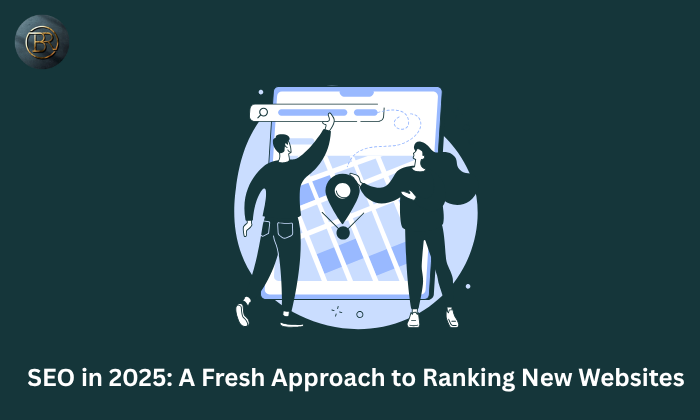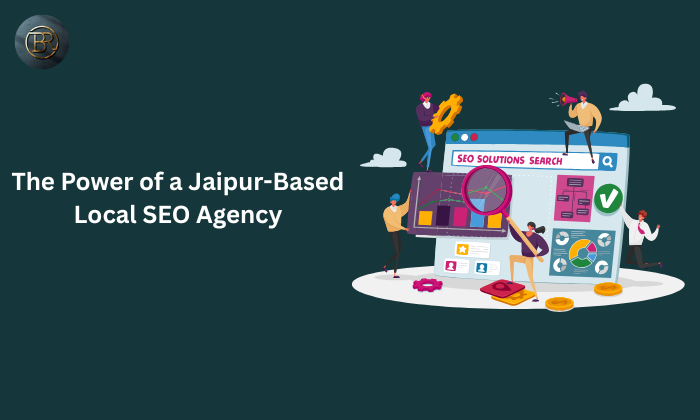- Have any questions?
- +91-7877951456
- +91-8529513022
- brsoftsolution@gmail.com
SEO in 2025: A Fresh Approach to Ranking New Websites

Boost Your Small Business with Local SEO Services in Jaipur
June 10, 2025Starting a new website in 2025? You are not alone, but with millions of new domains going live each year, how can you guarantee your site doesn’t get lost in the digital throng? Here is a look at how SEO is evolving in 2025: Rivalry is fiercer than ever, algorithms are more accurate, and techniques are more advanced. Don’t worry, though; we have the playbook required to distinguish your fresh website and ranking.
We will guide you in this book through the most recent SEO trends, Google algorithm adjustments, the growing use of AI in search, and pragmatic approaches customised particularly for new websites. This one is for you, whether you are a solo entrepreneur, a startup leader, or a digital marketer developing from scratch.
The SEO Landscape in 2025: What’s Changed?
Search is Smarter—and Intelligent—thanks to AI-driven algorithms like Google’s MUM (Multitask Unified Model) and Search Generative Experience (SGE), and will be the most significant change in SEO in 2025. They have graduated far above mere keyword matches and understood the intents, contexts, and perhaps emotions. It’s about providing significant responses in natural language now rather than cramming pages with keywords.
Zero-Click and AI-Generated Answers
Many consumers are receiving answers without visiting websites, as AI-powered search results are front and centre. This means you have to maximise not only rank but also visibility in knowledge panels, AI summaries, and rich snippets.
Google Algorithm Updates: What to Know in 2025
Important changes in 2025 consist of:
Helpful Content 2.0: Google’s revised system now more accurately detects AI-generated drivel and rewards material with genuine insights and knowledge.
Page Experience 2025: Core Web Vitals now include Interaction to Next Paint (INP), so reflecting your site’s responsiveness.
SpamBrain Evolution: Google’s AI spam-fighting tool is more advanced and penalizes deceptive techniques and link schemes even more effectively.
Translation? New websites should prioritise people, be unique, be fast, and be educational.
Friend or Foe: AI and SEO?
Raising Your SEO Plan with Artificial Intelligence
AI is your ally too; it is not only on Google’s side. These are ChatGPT, Jasper, and SurferSEO, among other tools:
Create content outlines.
Evaluate the pages ranking highest.
Semantically optimized
Anticipate search purposes.
Authenticity and human insight will always be superior; AI should supplement, not replace.
E-E-A-T gets stronger.
Still important in 2025 are experience, expertise, authoritativeness, and trustworthiness (E-E-A-T). Your distinct voice and authority are what Google—and consumers—want, even if artificial intelligence can assist with research and organisation.
Establishing SEO bases for fresh websites
The foundation counts if you are starting anew. This is how to have your site ready for success.
1. Begin with intelligent keyword research.
Find using tools like Google Keyword Planner, Ahrefs, or Semrush:
Long-tail keywords with little rivalry
Your audience is posing questions.
Keywords with commercial or informational purposes
Instead of focusing on shoes,” aim for the best running shoes for flat feet in summer 2025.”
2. Perfect Website Structure.
A clear design appeals to users as well as search engines. On a new website:
Adopt a basic hierarchy: Home > Category > Post.
Develop cornerstone pages for major subjects.
Guarantee simple internal linking.
3. Create a mobile-first and speedy site.
In 2025, everything moves quickly. Your page should load in less than 2.5 seconds, according to Google. Ad optums,
Use WebP to compress pictures.
Select a light theme or design.
4. Get Indexed Fast
To help you see faster SEO results:
Send Google Search Console your sitemap.
Don’t use “Fetch as Google” for important pages.
To boost crawl signals, distribute your material on social media.
Content is still king, but better.
Content in 2025 should be quality above volume in the SEO scene.
Make content driven by values topically relevant.
Emphasise resolving enquiries and difficulties. Utilise the topic cluster” approach.
Deep manuals (like this one)
Cluster Content: Associated pillar-related blogs
This builds topical authority and helps to keep readers interested over a longer period.
Multimedia should be included. Short explainers or films
Interactive tools or calculators
These features boost SEO indicators, engagement, and dwell time.
User Experience (UX) Is Non-Negotiable
Few factors influence the Google algorithm as much as user experience metrics, including bounce rate, dwell time, and engagement.
Some of the highlights include easy navigation, loading speed, and a clean layout.
Little pop-ups or offensive advertising
Accessibility to every user
Also, to check how your website works across devices and on mobile—that’s where most of your traffic will originate.
New Sites’ Off-Page SEO
Backlinks still matter; it is approximately quality in preference to quantity.
Get valuable links by:
Guest posting on specialised, relevant sites
Sharing original data or research
Making connections with influencers and experts in particular fields
Getting included in business directories
If you’re a local company, don’t undervalue local SEO‘s effectiveness. You will benefit if you review and claim your Google Business Profile early on.
Stronger Brand and Social Signals
More than ever, search engines are using brand mentions, social proof, and reputation signals.
Increase your visibility with:
Social sharing (particularly LinkedIn, YouTube, and Instagram in 2025)
Collaborations of influencers
Early development of your brand identity is essential; Google takes notice when consumers look up your company name.
Conclusion
Gaming the system won’t help you in 2025; instead, SEO is about creating genuine, meaningful experiences for actual people. For first websites, this implies means from day one, emphasis clarity, authenticity, speed, and strategy. With artificial intelligence on your side, smart content planning, and a user-first attitude, you can rise quicker than ever.
Every site begins with zero traffic. Your online presence may develop into something strong, lucrative, and lasting with the correct SEO approach, though. Set to rank in 2025? Let’s create something wonderful from the ground up.
Read More – Local SEO Services in Indore



